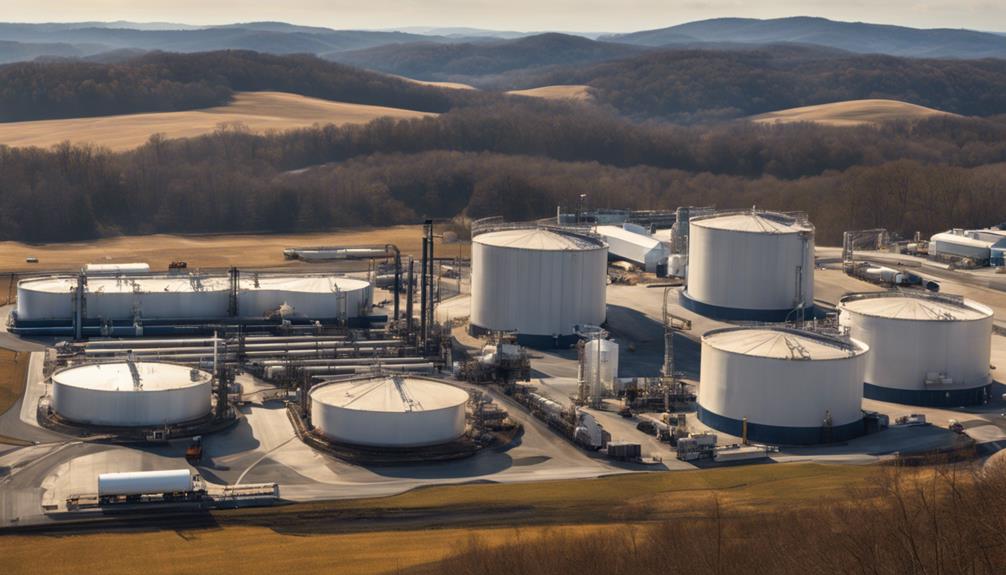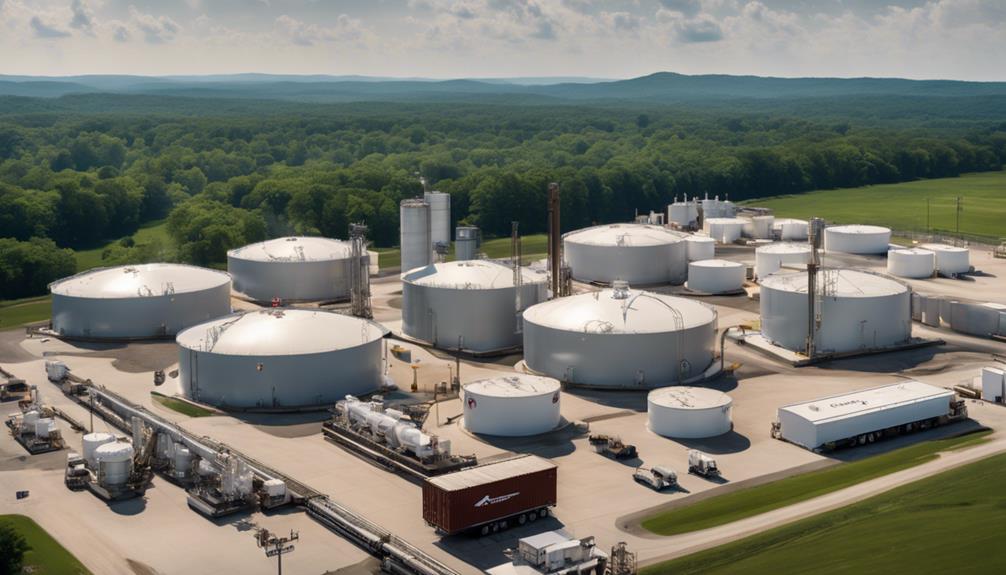If you're involved in the fuel distribution industry in Virginia, understanding the Terminal Operator Bond is crucial for your operations. This bond not only reflects your commitment to compliance with tax and environmental regulations but also safeguards the state's revenue. You might wonder how this bond could impact your business credibility and relationships with regulators. As we explore the specific requirements and processes involved, you'll see how essential this bond is for maintaining operational integrity and trust. What happens if you overlook this requirement?
Overview of Virginia Fuels Tax

Virginia's fuels tax is a crucial component of the state's revenue system, and it often impacts your wallet when filling up at the pump. This tax applies to gasoline, diesel, and other fuels, generating significant funds for transportation projects, road maintenance, and infrastructure improvements.
As a driver in Virginia, you're likely to notice this tax reflected in the price you pay at the gas station. The fuels tax is structured as a per-gallon tax, which means it varies based on the type of fuel you purchase. For gasoline, the tax rate is set and adjusted periodically, while diesel fuel may have a different rate altogether.
This tax not only covers immediate transportation needs but also contributes to long-term planning for the state's transportation future. Understanding how fuels tax works can help you make informed decisions about your fuel consumption.
When you fill up, remember that a portion of your payment goes toward funding vital infrastructure projects that benefit all travelers. Keeping an eye on fuel prices and tax changes can also help you manage your budget effectively.
What Is a Terminal Operator Bond?
A terminal operator bond is a type of surety bond that plays a vital role in the fuel industry, particularly for those managing bulk fuel storage and distribution. This bond serves as a financial guarantee that you'll comply with state regulations regarding fuel taxes and environmental standards, ensuring that your operations align with the requirements set forth by state authorities.
When you obtain this bond, you're essentially promising to adhere to the laws governing fuel handling, storage, and distribution, which is crucial for maintaining compliance and supporting infrastructure funding as outlined in Fuel Tax Bonds.
The bond is required by state authorities to ensure that terminal operators operate responsibly and ethically. If you fail to meet your obligations, such as neglecting tax payments or causing environmental damage, the bond provides a means for affected parties to seek compensation. In other words, it protects the state and the public from potential financial loss caused by your actions.
To get a terminal operator bond, you'll typically need to work with a surety company, which will evaluate your financial stability and business practices. Once approved, you'll pay a premium, which is a small percentage of the bond amount.
This bond not only helps you stay compliant but also builds trust with clients and regulators in the fuel industry.
Importance of the Terminal Operator Bond

Having a terminal operator bond isn't just a regulatory requirement; it's a key element that underpins the integrity of the fuel industry. This bond acts as a safety net, ensuring that terminal operators comply with state regulations and fulfill their tax obligations.
By securing a bond, you show your commitment to ethical practices and financial responsibility, which builds trust with both regulators and customers. Furthermore, similar to cigarette tax bonds, this bond plays a crucial role in protecting state revenue from unpaid taxes and fees.
Moreover, the bond protects the state's revenue system. If a terminal operator fails to pay the required taxes, the bond can be used to cover those losses. This means that the financial burden doesn't fall on the shoulders of taxpayers, maintaining the stability of the fuel market.
Additionally, having a terminal operator bond enhances your business's credibility. It signals to clients and partners that you're serious about adhering to industry standards and regulations. In an industry where trust is paramount, this can set you apart from competitors.
Ultimately, the terminal operator bond is more than a piece of paper; it's a vital tool for ensuring accountability and fostering a transparent and reliable fuel industry. Embracing this requirement can lead to long-term success for your business.
Eligibility Requirements for the Bond
Obtaining a terminal operator bond requires meeting specific eligibility criteria that ensure you're equipped to handle the responsibilities tied to fuel operations.
First, you must be a licensed terminal operator in Virginia, complying with all state regulations. This means you should have the appropriate permits and licenses to conduct fuel operations legally.
Next, you'll need to demonstrate financial stability. Insurers typically look for a solid credit score and a history of managing financial obligations. This helps them assess your ability to fulfill your bond requirements.
Additionally, you may need to provide proof of your experience in the fuel industry, showcasing your understanding of operations, safety standards, and relevant laws.
Moreover, it's crucial to have a clean legal record. Any past violations related to fuel handling or environmental regulations can hinder your eligibility.
Insurers often review your business's history, so it's wise to ensure compliance with all regulations.
Application Process for the Bond

To apply for a terminal operator bond in Virginia, you'll need to gather essential documents and complete a straightforward application.
Start by collecting your business information, including your legal business name, Federal Employer Identification Number (FEIN), and any relevant licenses. You'll also need to provide details about your terminal operations, such as the location and type of fuels handled.
Next, you should reach out to a surety bond company or broker. They'll guide you through the application process, which typically involves filling out forms and providing the gathered documentation.
Be prepared to answer questions about your financial stability and operational history, as surety companies assess your risk before issuing the bond.
Once you submit your application, the surety company will review it and may require additional information. If everything checks out, they'll issue the bond, and you'll need to pay the premium.
After that, you can submit the bond to the appropriate Virginia regulatory authority. This process ensures you're compliant with state requirements and can operate your terminal effectively.
Compliance and Reporting Obligations
While managing terminal operations in Virginia, you must adhere to specific compliance and reporting obligations to maintain your bond and stay in good standing with regulatory authorities.
First, you'll need to accurately report your fuel sales, purchases, and inventory levels on a regular basis. This ensures transparency and allows the state to track fuel taxes effectively. Understanding the importance of compliance is crucial, as failing to meet these requirements can lead to significant penalties, similar to U.S. Customs Bonds violations.
You're also required to file your fuel tax returns promptly. Depending on your operation's size, this could be monthly or quarterly. Make sure you keep detailed records of all transactions, as these documents will support your filings and may be requested for audits.
Additionally, you must comply with any updates to state regulations regarding fuel taxes. It's essential to stay informed about any changes that could affect your operations or reporting requirements.
Lastly, you should maintain your terminal operator bond in good standing by ensuring that all fees and taxes are paid on time.
Regularly review your compliance status and seek assistance if you're unsure about any requirements. By staying proactive, you can avoid complications and ensure smooth operations within the framework of Virginia's fuel tax regulations.
Consequences of Non-Compliance

Non-compliance with Virginia's fuel tax regulations can lead to serious consequences for your operations. If you fail to meet your tax obligations, you may face steep penalties and fines. These financial repercussions can significantly affect your bottom line, making it crucial to stay compliant.
Additionally, non-compliance can lead to the suspension or revocation of your terminal operator license. This can halt your operations and damage your reputation in the industry, making it difficult to regain trust from partners and customers.
You might also encounter legal actions, which could involve costly litigation and further financial strain.
Moreover, the state may conduct audits to enforce compliance, and if discrepancies are found, you'll be liable for back taxes, interest, and additional penalties. This not only puts your financial stability at risk but can also divert your focus from core business activities.
Resources for Terminal Operators
Many terminal operators find themselves in need of reliable resources to navigate Virginia's fuel tax landscape effectively.
First, you should familiarize yourself with the Virginia Department of Taxation's website. It offers up-to-date information about tax rates, deadlines, and forms. Utilize the frequently asked questions (FAQs) section to clarify any uncertainties you might have.
Next, consider joining industry associations, such as the Virginia Petroleum and Convenience Marketers Association (VPCMA). Networking with peers provides valuable insights and shared experiences that can enhance your understanding of compliance requirements. You can also access training sessions and seminars they offer.
Additionally, consult with a tax professional who specializes in fuel tax regulations. Their expertise can save you time and help you avoid pitfalls.
Don't forget to keep an eye on legislative changes. Subscribing to industry newsletters or alerts will ensure you stay informed about any upcoming changes that could affect your operations.
Lastly, maintaining strong relationships with your suppliers and distributors can also provide support and guidance as you navigate these laws.
Conclusion
In summary, understanding the Virginia Fuels Tax and the necessity of a Terminal Operator Bond is crucial for your business. By securing this bond, you not only comply with regulations but also strengthen your credibility in the industry. Remember, maintaining compliance is key to avoiding penalties and ensuring smooth operations. Stay informed and proactive, and you'll support both your business's success and the integrity of Virginia's fuel distribution system.


